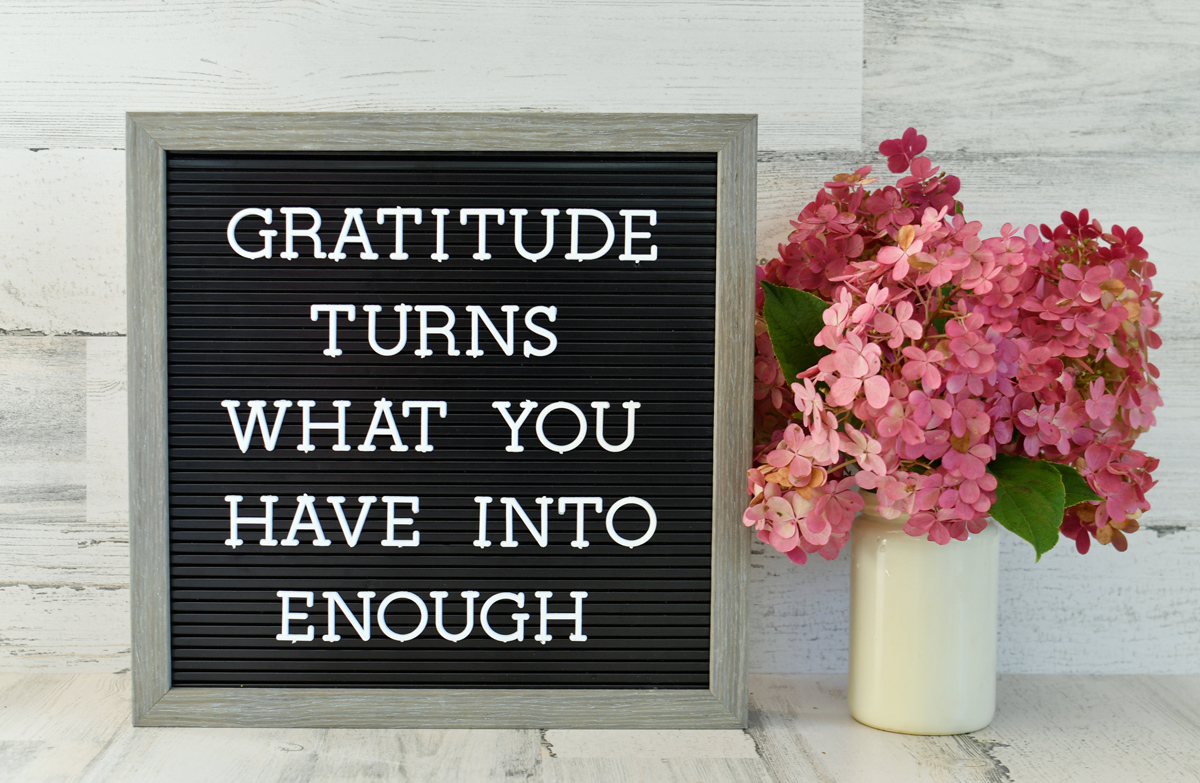🙏 Gifts of Gratitude
This months’ “Flourish” newsletter is dedicated to you in gratitude and appreciation for each of you who invests your energies to read and perhaps reflect on the articles I write for this newsletter. I appreciate your readership, your presence, and being in relationship with you.
As I reflect on 2023, a year of many challenges and many blessings, I believe there is still much to be thankful for. Through my studies, I’ve learned that gratitude is good for our wellbeing, and so I strive to pause each day and notice the positives with thankfulness.
Indeed, gratitude is good for us – and the benefits of gratefulness go well beyond simply making us feel good.
What is gratitude? Gratitude is noticing and acknowledging the goodness, the positives, the blessings in our lives. Robert Emmons, PhD, writes that gratitude is not simply a feeling – it is much more (2007). The experience of gratefulness calls us to recognize that we have benefited from someone’s kindness. And gratitude implies humility in understanding that others have contributed to who we are or where we are in our lives – “that we are the recipients of goodness” (Emmons, 2007, p. 6).
Most of us want to feel happier and experience greater well-being, and gratitude can help us experience more positive emotions (Sheldon & Lyubomirsky, 2006; Emmons, 2007). While we may not be able to change the circumstances we face, we do have great influence over what we focus on. We have a choice about our attitude (Frankl, 1959). We can choose to notice our blessings as well as our burdens.

Considerable scientific evidence shows that when we practice gratitude regularly and systematically, there can be many benefits relationally, physically, and psychologically (Emmons & McCullough, 2003; Emmons, 2007). And a research study by psychologists suggests that “a conscious focus on blessings may have emotional and personal benefits.”
Many of us can benefit from learning how to infuse our lives with more moments to pause and notice our gratitude. And changing our habits typically happens step-by-step, rather than all at once (Berns-Zare, 2020).
Gratitude researcher, Robert Emmons (2007; 2016) offers a menu of strategies to cultivate a gratitude habit. Here are four practices to try:
🤔 Reflecting on Three Questions Each Day. This strategy is drawn from the Buddhist practice of self-reflection called Naikan. Self-reflecting can be related to any area of your life – relationships and social interactions, professional/work situations, self-development, social action, or connecting with the higher aspects of yourself or the interconnections among all living things. The three questions:
- What support, kindness, or care have I received from others?
- What have I shared with or contributed to others?
- What difficulty or trouble have I been the cause of?
This practice can be used as a springboard for self-reflection. Try it for ten minutes each day. At the end of the week, consider an action you might want to take.
📝 Writing in a Daily Gratitude Journal. Set aside a few minutes each day to remember moments that you feel thankful for. For example: walking in nature, listening to music, watching a play or great movie, talking with a loved one or friend, a gesture of kindness, a positive change in your health, the taste of a bite of food, a beautiful flower, leaf, or tree, watching the sunrise or sunset, the sounds of moving water, a moment of quiet or a moment of joy.
💬 Being Aware of Your Language During the Day. The language we use in our daily lives impacts how we see ourselves and the world. Integrating the language of gratitude into your everyday self-talk can stimulate the experience of gratitude. Examples of thankful words include: appreciative, gifts, fortunate, wonderful, thankful, blessed, awesomeness, praise, grace, thankfulness.
🧘 Taking a Mindful Pause for Gratitude. During the day, especially when you’re feeling stressed, you can pause for a moment of gratitude. As you’re inhaling, thinking “Breathing in love,” and as you’re exhaling, “Breathing out gratitude.” You might think about someone or something you are grateful for or appreciative of as you do this.
Where might more gratitude or thankfulness fit into your life?
🎁 To help you make a positive shift in your life, I offer you this gift…
Drawing on ideas from positive psychology, mindfulness, and neuroscience along with mind, body, spirit integrative practices, this powerful 5-Step Personal Discernment Process can assist you to contemplate and create action for your next steps on life’s path:
PARDA 5-Step Awakening and Action Process (Berns-Zare, 2020)
Thank you for your readership and being present in my life. I wish you well on your path.
Kind Regards,
Ilene
© 2023 Ilene Berns-Zare, LLC, All Rights Reserved
Disclaimer: This article is for informational purposes only. No content is a substitute for consulting with a qualified mental health or healthcare professional.
Send your comments and suggestions to Ilene!
Click here or simply hit “Reply” to send Ilene an email with your thoughts about this newsletter.
References:
- Berns-Zare, I. (2020). 5 Steps for Greater Perspective and a Positive Shift: This 5 step awakening process may help you re-energize, reduce negativity, and gain greater clarity.
- Berns-Zare, I. (2020). 6 Powerful Ways to Build New Habits: How strengthening your habits can strengthen your brain.
- Emmons, R.A. (2016). The little book of gratitude: Create a life of happiness and wellbeing by giving thanks. New York, NY: Hachette Book Group.
- Emmons, R.A. (2007). Thanks! How the new science of gratitude can make you happier. Boston, MA: Houghton Mifflin Company.
- Emmons, R. A., & McCullough, M. E. (2003). Counting blessings versus burdens: An experimental investigation of gratitude and subjective well-being in daily life. Journal of Personality and Social Psychology, 84(2), 377-389.
- Frankl, V. (1959). Man’s search for meaning. New York, NY: Washington Square Press.
- Sheldon, K. M., & Lyubomirsky, S. (2006). How to increase and sustain positive emotion: The effects of expressing gratitude and visualizing best possible selves. The Journal of Positive Psychology, 1(2), 73-82.
Ilene is a Featured Author on PsychologyToday!
Read her blog series Flourish and Thrive: Navigating transitions with mindfulness and resilience.

Is it time to add a little more gratitude into your daily life?
Tap into your strengths, purpose, and potential to flourish in life and work.
If you’d like to discuss how Ilene Berns-Zare Coaching can help you achieve your goals, contact Ilene.
Coaching with Ilene Can Help You Call Yourself to Action
Ilene Berns-Zare, PsyD, PCC, CEC, is an Executive and Personal Coach and Speaker. Ilene helps people live their best personal and professional lives by bringing mind, body, and spirit into flow with strengths, purpose, and potential. She inspires clients to find fresh perspectives and access their full potential as creative, resourceful, whole persons. Find Ilene online, set up a free discovery coaching consultation, and access free resources at https://ibzcoaching.com/.
Please share this blog with anyone who might be interested in reading it!
We would love to hear from you! We are interested in your suggestions for this newsletter, your reactions to this one, or providing more information about coaching.



